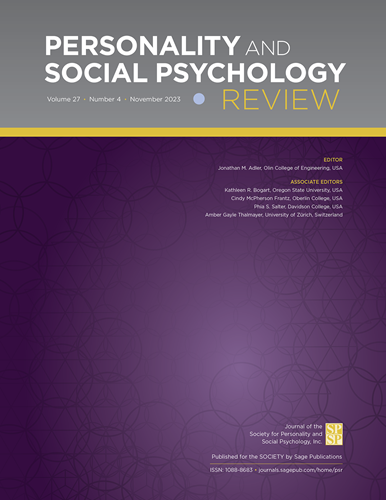Why People "Lie Flat"? An Integrative Framework of Social-Psychological Pathways in China.
IF 10.4
1区 心理学
Q1 PSYCHOLOGY, SOCIAL
引用次数: 0
Abstract
Academic abstract"Lying flat" is manifested as opting out, often marked by aimlessness and a pessimistic outlook. While this raises clinical concerns, it may carry a positive meaning in Chinese culture, emphasizing the pursuit of inner calmness and fulfillment. Despite its growing prevalence on Chinese social media, its antecedents and implications are still unclear. To address this gap, we first define "lying flat" and trace its emergence in Chinese society. Next, we propose an integrative model that elucidates how Taoism and Buddhism, social expectations, and involution contribute to "lying flat." By incorporating insights from Western theories, we aim to provide a comprehensive understanding of this culturally rooted lifestyle. Finally, we lay out a research agenda by proposing specific hypotheses regarding its effects on well-being and social functioning, with the goal of clarifying its potentially adaptive aspects in contrast to its clinical ones. We also discuss implications for mental health professionals and policymakers.Public abstract"Lying flat" outwardly manifests as opting out, often associated with a sense of passivity and lack of direction. Yet within Chinese culture, it might hold a deeper meaning: the pursuit of inner peace as a path to personal fulfillment. This lifestyle has recently gained widespread attention in China. Despite its increasing prevalence, much remains unknown about its origins and implications. In this article, we explain what "lying flat" is and how it has emerged in Chinese society. Our model demonstrates how factors, such as Taoism and Buddhism, social expectations, and involution, drive this behavior. By integrating insights from Western theories, we aim to provide a comprehensive understanding of this culturally rooted lifestyle. We also present hypotheses about its effects on well-being and social functioning, aiming to clarify its potentially adaptive features in contrast to those that may raise clinical concerns. We propose practical strategies for mental health professionals and policymakers.为什么人会“平躺”?中国社会心理路径的整合框架。
“平躺”表现为选择退出,通常以漫无目的和悲观的态度为特征。虽然这引起了临床的关注,但在中国文化中,它可能具有积极的意义,强调对内心平静和满足的追求。尽管它在中国社交媒体上越来越流行,但其起源和影响仍不清楚。为了解决这一差距,我们首先定义了“平躺”,并追溯其在中国社会的出现。接下来,我们提出了一个综合模型来阐明道教和佛教、社会期望和内化是如何促成“平躺”的。通过结合西方理论的见解,我们旨在提供对这种根植于文化的生活方式的全面理解。最后,我们通过提出关于其对福祉和社会功能的影响的具体假设来制定研究议程,目的是澄清其潜在的适应性方面,而不是临床方面。我们还讨论了对精神卫生专业人员和政策制定者的影响。公开摘要“平躺”表面上表现为选择退出,通常与被动和缺乏方向感有关。然而,在中国文化中,它可能有更深的含义:追求内心的平静是实现个人成就的途径。这种生活方式最近在中国引起了广泛关注。尽管它越来越流行,但关于它的起源和影响仍然未知。在这篇文章中,我们解释了什么是“平躺”,以及它是如何在中国社会出现的。我们的模型展示了道教和佛教、社会期望和内化等因素是如何驱动这种行为的。通过整合西方理论的见解,我们旨在全面了解这种植根于文化的生活方式。我们还提出了关于其对健康和社会功能的影响的假设,旨在澄清其潜在的适应性特征,而不是那些可能引起临床关注的特征。我们为精神卫生专业人员和政策制定者提出了切实可行的策略。
本文章由计算机程序翻译,如有差异,请以英文原文为准。
求助全文
约1分钟内获得全文
求助全文
来源期刊

Personality and Social Psychology Review
PSYCHOLOGY, SOCIAL-
CiteScore
19.00
自引率
1.90%
发文量
20
期刊介绍:
Title: Personality and Social Psychology Review (PSPR)
Journal Overview:
Official journal of SPSP, the Society for Personality and Social Psychology, Inc.
Premiere outlet for original theoretical papers and conceptual review articles in all areas of personality and social psychology
Features stimulating conceptual pieces identifying new research directions and comprehensive review papers providing integrative frameworks for existing theory and research programs
Topics Covered:
Attitudes and Social Cognition: Examines the inner workings of the human mind in understanding, evaluating, and responding to the social environment
Interpersonal and Group Processes: Explores patterns of interaction and interdependence characterizing everyday human functioning
Intergroup Relations: Investigates determinants of prejudice, conflict, cooperation, and harmonious relationships between social groups
Personality and Individual Differences: Focuses on causes, assessment, structures, and processes giving rise to human variation
Biological and Cultural Influences: Studies the biological and cultural mediation of social psychological and personality processes
 求助内容:
求助内容: 应助结果提醒方式:
应助结果提醒方式:


